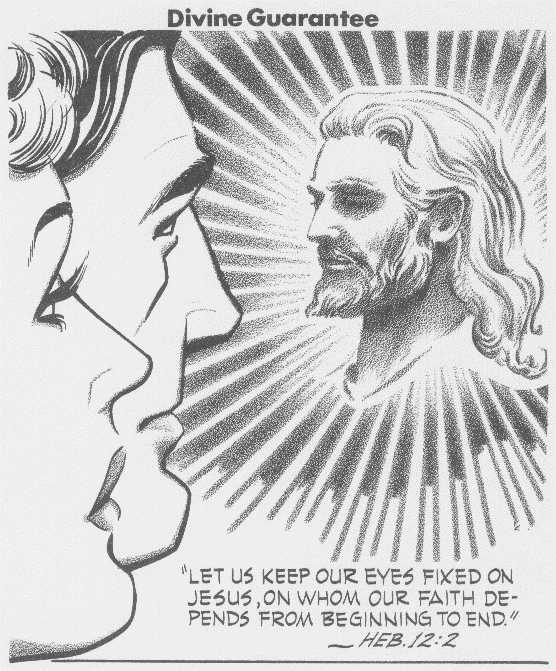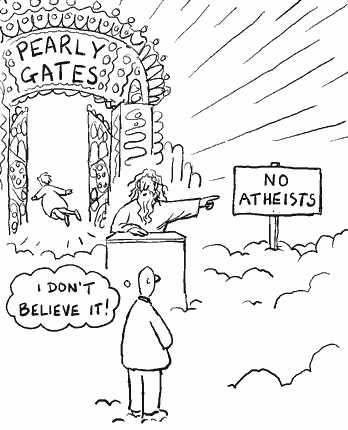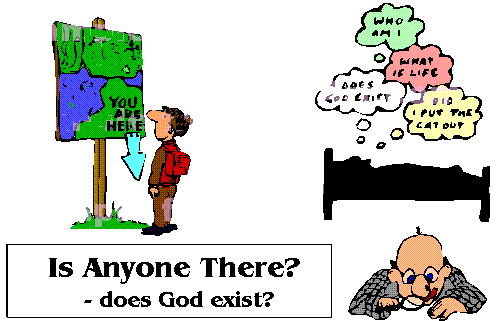FALSIFIABILITY | RESURRECTION | PRAYER | BIBLE | GOD EXISTS | REALITY | HOME
The Reality of God
Eight Philosophical/Theological Arguments for the Existence in God
Here is a brief summary of some of the main arguments used by theologians over the years to show that God does exist. Please do not decide that any of them are wrong without researching the complete argument from the references given. In each case I have tried to present it in an easy to understand way. I have tried to include some quotes from the theologians. Some of these ideas took very smart men a long time to think up. Sometimes it takes them a while to sink in. Be patient with yourself. Only one of these arguments needs to be valid in order for the fact of God's existence to be known to be true.
LEWIS'S ETHICAL CHOICES ARGUMENT
|

|
(1) God exists because we know there is a difference between right and wrong. There can be no law unless there is a lawgiver. Without God to make us aware of good and evil all we would have is what we like and what we do not like.
This argument has been around for centuries and is based on something Immanuel Kant, (1724-1804), called the "Moral Law Within." Perhaps the best explanation of it was by C. S. Lewis in his book Mere Christianity. (1955) Lewis explains at some length that there is something inside us that judges between our instincts based on ethical and moral grounds. This unique quality in us logically requires the existence of a moral architect and designer.
Lewis's excellent explanation is too lengthy to be included here so instead here is one from B. B. Baxter, which, while not a good as Lewis's has the virtue of brevity. "The fact that men are creatures of choice and the further fact that their choices are made in terms of some awareness of moral and ethical principals are firm evidences that they originated from a source that also had the capacity of making moral and ethical judgments. The atheist has a severe burden of proof at this point. In order for his position to be accepted, he must demonstrate how a morally responsible being could come from a purely materialistic source. Particularly impressive is the fact that man functions not merely in the direction of his strongest instincts, but that he often acts in a different direction." Page 52, I Believe Because by B. B. Baxter.
In Jeremiah 9:23-24 we find that knowing God is better than strength and riches.
|
COSMOLOGICAL ARGUMENTS OF AQUINAS
Thomas Aquinas (1224-1274) is credited with these arguments although earlier forms of them can be found, although perhaps not so clearly stated. I must urge you to read the details of these carefully from other sources before rejecting any of them based on their brief introduction here. You will notice they are very similar when presented in this outline format but if you look at the arguments in their entirety you will learn that they are really quite different.
(2) God is the prime mover.
We know that things do not move unless something starts them to moving. Once in motion they gradually slow down and eventually stop. Since there are some things in the universe moving something had to start them in motion and since they are still moving it must have happened at some particular moment in time. That first mover is God and that moment in time is creation.
If we look up at the sky where the sun, moon, planets and stars are in motion according to Psalm 19:1 we are seeing the work of God. (Firmament or expanse both mean sky)
(3) God is the uncaused first cause.
Everything we know about happens because something caused it to happen so there must have been some original cause where it all started. According to Genesis 1:1 that original cause is God.
(4) If there were no God nothing would exist.
Everything we know exists could also not exist. Since they do exist instead of not existing there must be some reason for their existence. That reason is God. According to John 1:1-3 the Word (i.e. Jesus Christ) was present with God in the beginning.
Cosmological argument websites:
www.trinity.edu/cbrown/intro/cosmological_argument.html
en.wikipedia.org/wiki/Cosmological_argument
www.leaderu.com/offices/billcraig/docs/smith.html
www.leaderu.com/offices/billcraig/docs/matson.html
philosophy.lander.edu/intro/aquinas.html
www.leaderu.com/offices/billcraig/docs/oppy.html
Books:
Cosmological Argument from Plato to Leibniz by William Lane Craig
The Cosmological Argument by William L. Rowe
Cosmological Argument: A Reassessment by Bruce Reichenbach
The Kalam Cosmological Argument by William Lane Craig
TELEOLOGICAL ARGUMENTS
(5) Design demands there must be a Designer. (Sometimes called Paley's Watchmaker Argument)
William Paley (1743-1805) was a British philosopher-theologian. His argument is based on the idea that just as a watch, with its intelligent design and complex function must have been created by an intelligent maker: a watchmaker, the universe, with all its complexity and greatness, must have been created by an intelligent and powerful creator.
A recent article said,
"It is a shame so much of the dialogue of the last 35 years between Christianity and science has centered on the age of the earth and creation science. It has left the average person, Christian and non-Christian alike, with the impression that modern science and the Bible are seriously at odds, maybe irreconcilably so.
"It is ironic this impression has developed during the same period of time that scientific understanding and the attitudes of many modern scientists have moved strongly toward belief in an intelligent creator as a result of the scientific discoveries of the past 35 years. A preoccupation with the age question has only diverted discussion from the strong, scientific supporting evidence for Biblical theism, putting this very bright light under a bushel basket, so to speak."
from The Real Issue: Scientific Evidence for the Existence of God by Dr. Walter Bradley at www.leaderu.com/real/ri9403/evidence.html
In Romans 1:19-20 we see that God's nature can be clearly seen in His creation.
(6) Since some things are better than others something must be best, (i.e. God)
This same argument can be used of other qualities. Some things are stronger than others so there must be something in the universe that is strongest, (i.e. God). Some things are more beautiful than others so something has to be the most beautiful, (i.e. God) This is perhaps the weakest argument here since it is possible for one thing to be the strongest and something else to be the most beautiful. I include it here only because historically it was widely used. (Perhaps a better related argument is the esthetical argument that the presence of beauty and sublimity in the universe and the response of man to such beauty could not possibly have both happened by accident. This is similar to the Lewis argument above.)
In Psalm 96:4-6 we read that God is great.
Teleological argument websites:
www.leaderu.com/offices/billcraig/docs/barrow.html
en.wikipedia.org/wiki/Teleological_argument
members.aol.com/plweiss1/paley.htm
apologetics.johndepoe.com/teleo.html
Book:
God and Design: The Teleological Argument and Modern Science by Neil A. Manson
ANSELM'S ONTOLOGICAL ARGUMENT (I will stipulate this one is in some doubt already)
(7) God exists because it is unthinkable that he does not exist. Every time I look at this one I have to study it again all over like I have not seen it before. It is probably the hardest one to understand of all of them. To tell the truth, I'm not sure I have it clear in my head yet.
Archbishop Anselm (AD 1033-1109) was a brilliant teacher and defender of the Christian faith. He was archbishop of Canterbury England. His Ontological Argument for the existence of God is briefly outlined here. This unique argument has been debated for centuries among many great philosophers.
A) God is defined as the being of which none greater is possible.
B) The notion of God exists in the understanding of your mind
C) That God may exist must at least be accepted as a possibility.
D) If God only exists in the mind, and yet may have existed, then God might have been greater than He is.
E) If (D) is true, God might have been greater than He actually is in reality.
F) Therefore if (D) and (E) are true, God is a being which a greater is possible.
G) F is not possible (since it violates Aristotle's non-contradiction) because (A) is the definition of God.
H) Therefore God exists in reality as well as the mind.
www.biblicaldefense.org/Writings/ontological_argument.htm
|
DIRECT OBSERVATION
(8) The existence of God is intuitively obvious to the most casual observer. What is being said here is that everyone knows that God exists. They simply bury their heads in the sand like an ostrich hoping to escape accountability before their maker.
This argument was expressed well by Augustine over 1500 years ago. Considered to be one of the most outstanding theologians in the history of the Christian Church, Augustine was born in North Africa in 354 A.D. and died there in 430. He is known as Augustine of Hippo.
Other theologians have added to it and restated it since that time. A recent example: "Man has an innate, natural capacity to apprehend God's existence even as he has a natural capacity to accept truths of perception (like "I see a tree"). Given the appropriate circumstances- such as moments of guilt, gratitude, or a sense of God's handiwork in nature-man naturally apprehends God's existence." from Introduction: The Resurrection of Theism by William Lane Craig found at www.leaderu.com/truth/3truth01.html
That being said this argument is probably best stated in the scriptures in Jeremiah 31:34 and Psalm 139:7-14.
See also Hebrews 11:6 and Psalm 53:1.
|

|
CONCLUSION
I have presented eight of reasons that theologians give that God exists. It gives me confidence to know these arguments exist. But remember only one of them needs to be valid for God's existence to be demonstrated. The final one is tied up with the "Answered Prayer" pillar of by belief in God. Realistically, it can not be refuted without also refuting that pillar.

FALSIFIABILITY | RESURRECTION | PRAYER | BIBLE | GOD EXISTS | REALITY | HOME


